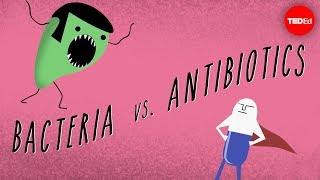(单词翻译:单击)
What if I told you there were trillions of tiny bacteria all around you? It's true.
如果我告诉你,你周围有数以万亿计的细菌,你会怎么想?这是真的。
Microorganisms called bacteria were some of the first life forms to appear on Earth.
细菌这种微生物,是地球上最初出现的几种生命形态之一。
Though they consist of only a single cell, their total biomass is greater than that of all plants and animals combined.
尽管只由一个细胞构成,细菌的生物量要比地球上全部植物和动物加起来还要多。
And they live virtually everywhere: on the ground, in the water,
而且它们几乎无处不在:地上、水里、
on your kitchen table, on your skin, even inside you.
你家厨房的台子上、你的皮肤上,甚至你的体内。
Don't reach for the panic button just yet.
但是,不要惊慌。
Although you have 10 times more bacterial cells inside you than your body has human cells,
尽管你体内的细菌数量要比你身体的细胞的数量多十倍,
many of these bacteria are harmless or even beneficial, helping digestion and immunity.
很多细菌是无害的,甚至是有益的,有些细菌帮助消化食物,有些可增加免疫力。
But there are a few bad apples that can cause harmful infections, from minor inconveniences to deadly epidemics.
但也有些有害细菌会引起感染,轻则造成身体不适,重则引起致命的流行病。
Fortunately, there are amazing medicines designed to fight bacterial infections.
幸运的是,人类已发明了神奇的药物来抗击细菌感染。
Synthesized from chemicals or occurring naturally in things like mold,
这种药物即抗生素,它由化学物质人工合成,或在霉菌中自然形成,
these antibiotics kill or neutralize bacteria
这些抗生素可以抑制或杀灭细菌,
by interrupting cell wall synthesis or interfering with vital processes like protein synthesis,
这是通过干扰细菌细胞壁合成,或介入像蛋白质合成等重要的生理活动来实现的,
all while leaving human cells unharmed.
抗生素在发挥作用时不会对身体细胞产生伤害。
The deployment of antibiotics over the course of the 20th century has rendered many previously dangerous diseases easily treatable.
20世纪抗生素的使用,使以前被看作是致命的疾病得以轻松治愈。
But today, more and more of our antibiotics are becoming less effective.
但今天,越来越多的抗生素逐渐失效。
Did something go wrong to make them stop working?
哪里出问题了?
The problem is not with the antibiotics but the bacteria they were made to fight,
抗生素的失效与其本身无关,而是与其“抗击”的细菌有关,
and the reason lies in Darwin's theory of natural selection.
其中的奥妙来自达尔文自然选择学说。
Just like any other organisms, individual bacteria can undergo random mutations.
同其他生物体类似,单个细菌会有随机的基因突变。
Many of these mutations are harmful or useless,
很多这样的基因突变对生物体自身是有害或无效的,
but every now and then, one comes along that gives its organism an edge in survival.
但时有发生的是,基因突变会为其带来生存的优势。
And for a bacterium, a mutation making it resistant to a certain antibiotic gives quite the edge.
对单个细菌而言,使其对特定抗生素产生抗药性的基因突变会让它获得极大的生存优势。

As the non-resistant bacteria are killed off,
无抗药性的细菌被消灭后,
which happens especially quickly in antibiotic-rich environments, like hospitals,
这在含抗生素较多的环境中极易发生,如医院
there is more room and resources for the resistant ones to thrive,
越来越多的空间和资源使得抗药性细菌生存下去,
passing along only the mutated genes that help them do so.
并将有抗药性的基因传递给后代。
Reproduction isn't the only way to do this.
繁殖不是细菌产生抗药性的唯一途径。
Some can release their DNA upon death to be picked up by other bacteria,
许多细菌在消亡前会释放出DNA,其他细菌会将该DNA摄为己有,
while others use a method called conjugation, connecting through pili to share their genes.
也有些细菌采用一种叫“接合”的方法,通过连接菌毛来分享基因。
Over time, the resistant genes proliferate, creating entire strains of resistant super bacteria.
一段时间以后,抗药性基因大量繁殖,形成超级细菌菌株。
So how much time do we have before these superbugs take over?
那么,有多少时间留给我们阻止超级细菌的形成?
Well, in some bacteria, it's already happened.
对一些细菌而言,超级细菌已经形成了。
For instance, some strands of staphylococcus aureus,
例如,金黄色酿脓葡萄球菌的某些菌株,
which causes everything from skin infections to pneumonia and sepsis,
这种细菌会引发各种疾病,如皮肤感染、肺炎、败血症,
have developed into MRSA, becoming resistant to beta-lactam antibiotics, like penicillin, methicillin, and oxacillin.
已经转变为MRSA(耐甲氧西林金黄色葡萄球菌),对β-内酰胺抗生素(如青霉素、甲氧西林、苯唑青霉素)有耐药性。
Thanks to a gene that replaces the protein beta-lactams normally target and bind to,
这是因为突变的基因代替了β-内酰胺抗生素通常靶向和联结的蛋白质,
MRSA can keep making its cell walls unimpeded.
MRSA才得以保持其细胞壁的畅通。
Other super bacteria, like salmonella, even sometimes produce enzymes like beta-lactams
其他超级细菌,如沙门氏菌,有时甚至可产生类似β-内酰胺的酶,
that break down antibiotic attackers before they can do any damage,
在抗生素发挥作用前分解抗生素,
and E. coli, a diverse group of bacteria that contains strains that cause diarrhea and kidney failure,
又如大肠杆菌的某些可造成腹泻或肾衰竭的菌株,
can prevent the function of antibiotics, like quinolones, by actively booting any invaders that manage to enter the cell.
可通过有效地阻止任何物质进入其细胞来使抗生素(如喹诺酮)失效。
But there is good news. Scientists are working to stay one step ahead of the bacteria,
但也有好消息。科学家们努力的步伐先于细菌产生抗药性的“步伐”,
and although development of new antibiotics has slowed in recent years,
而且尽管近几年新抗生素的发展速度减慢,
the World Health Organization has made it a priority to develop novel treatments.
世界卫生组织已赋予发展新型疗法优先权。
Other scientists are investigating alternate solutions, such as phage therapy or using vaccines to prevent infections.
其他科学家在研究替代方法,如噬菌体疗法,或使用疫苗来预防感染。
Most importantly, curbing the excessive and unnecessary use of antibiotics,
最重要的是,限制不必要和过量的抗生素使用,
such as for minor infections that can resolve on their own, as well as changing medical practice to prevent hospital infections,
如轻微感染可靠自愈、改变用药习惯来阻止医院获得性感染,
can have a major impact by keeping more non-resistant bacteria alive as competition for resistant strains.
可极大程度上改善现状,因为无抗药性的细菌的存活对抗药性细菌而言是竞争关系。
In the war against super bacteria, deescalation may sometimes work better than an evolutionary arms race.
在抵抗超级细菌的“战争”中,抑制其增长有时要比一个进化的“军备竞赛”有效。


